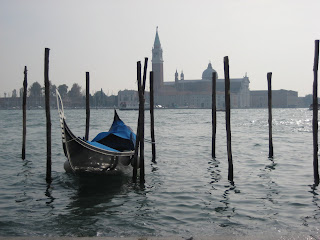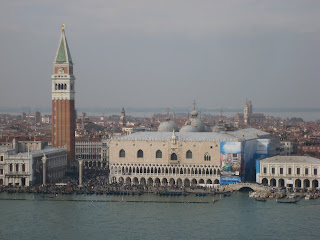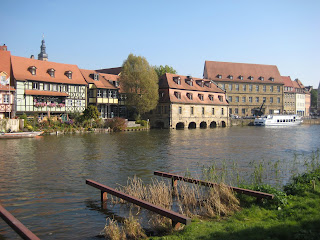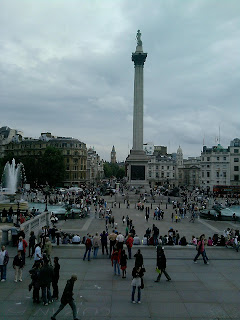Quería escribir hoy sobre mis problemas en el aeropuerto de Malta, cuando mi vuelo sufrió un retraso de ocho horas por la nieve (incluyendo una escala en Stuttgart), y de mi viaje a Starý Smokovec, en las montañas del Alto Tatras en Eslovaquia, pero la huelga salvaje e impresentable de los controladores aéreos españoles se ha colado en mi blog, como en tantos otros. No es la primera vez que escribo sobre el tema y temo que no será la última.
La noticia de esta huelga me sorprendió en Viena, donde estaba pasando la noche esperando a mi vuelo del día siguiente por la mañana. Debo admitir que me costó tiempo asimilar lo que estaba pasando, pues apenas daba crédito a lo que decía el canal de información 24 horas de TVE: abandonar el puesto de trabajo me parece lo último que debe hacer un trabajador. Inmediatamente, la parte irracional e impulsiva de mi cerebro ideó una solución: llevarles a la torre de control a punta de pistola: o trabajo o cárcel (la realidad no ha andado muy lejana, ¿verdad?). Una vez que parece que todo ha pasado y que voy leyendo algunas declaraciones de controlodares, tratando de justificarse, me veo casi obligado a dedicar algunas reflexiones a esta
casta de mierda (uff, espero que Blogger no me bloquee el blog por este calificativo algo escatológico, aunque merecido).
La primera es que todos, absolutamente todos, tenemos que asumir que el derecho de huelga no está siempre garantizado: hay trabajos que no pueden hacer huelga por su naturaleza e importancia para la sociedad. Ejemplos de estas profesiones son los médicos, bomberos, policías, soldados y, sí, controladores aéreos. Esto se debe tener claro cuando se decide por una opción profesional de esta lista. Si alguien no está dispuesto a renunciar a su derecho de huelga, puede considerar otras profesiones donde este derecho está plenamente garantizado: basurero, minero, obrero de la construcción o mensajero, entre otras muchas.
Segundo, no creo que trabajar 1600 horas a la semana con generosos descansos entre las jornadas y durante las mismas sea equiparable a condiciones de esclavitud. Quienes trabajan en régimen de esclavitud son, entre otros muchos en el mundo, desafortunadamente, los mineros chinos, los millones de mujeres que son obligadas a prostituirse o los empleados de multinacionales en países como Vietnam o Camboya. Semejante comparación sonroja a quien la escucha y descalifica a quien la hace. Haciendo un cálculo rápido, trabajar 1600 horas en un año, tomando cinco de vacaciones, supone 34 horas a la semana: una cifra muy inferior a las 40 horas que trabajamos el resto de españoles. Nuevamente, si estas condiciones le parecen a alguien inasumibles, pues simplemente se puede dedicar a otra profesión.
Tercero, los controladores aéreos no son los únicos trabajadores que tienen en sus manos la vida de otras personas, así que tampoco entiendo que ésta sea la razón de sus reclamaciones laborales. Los conductores de autobús, los policías o los maquinistas del AVE tampoco cuentan con mucho margen de error si se equivocan en su trabajo. Entiendo que semejante responsabilidad puede ser difícil de llevar mentalmente; aunque, por otra parte, también entiendo que quien no puede vivir con ello, es que no sirve para ese trabajo. Existen opciones en el mercado laboral de profesiones con mucha menor presión. A modo de ejemplo, en una cadena de montaje de una fábrica o en una caja de un supermercado no se toman decisiones de las que depende la vida de nadie, en la mayoría de los casos.
Cuarto, casi ningún país de nuestro entorno sufre estos problemas con sus controladores aéreos. Precisamente la semana pasada leía un artículo sobre los futuros controladores aéreos en Alemania y ninguno cuestionaba las condiciones laborales que conlleva esa profesión: es algo que se acepta y punto. Estados Unidos tuvo un problema similar y Ronald Reagan lo solucionó echando a la calle a todos los controladores y poniendo a militares en su lugar.
Quinto, duele ver a los representantes de su sindicato quejarse de las condiciones laborales y de la mala imagen que tienen en la sociedad (por cierto, todos somos responsables últimos de la imagen que los demás tienen de nosotros, imagen que construimos con nuestros actos y decisiones). Duele aún más con una tasa de desempleo del 20% en España. Duele aún más cuando a los funcionarios públicos les han rebajado el sueldo y cuando muchos otros trabajadores han aceptado rebajas laborales con tal de no perder su trabajo. Además, este sector debe ser el único en el que el sindicato de los trabajadores controla el número de plazas nuevas de controladores que se convocan en España; ¿se imagina alguien que los trabajadores de FASA Renault, por ejemplo, impusieran a la dirección de la compañía el número de trabajadores a contratar el año próximo? Pues eso.
Por último, ver estas imágenes de viajeros tirados en los aeropuertos españoles daña la imagen de nuestro país en el exterior, en una época turbulenta en la que esto es precisamente lo que menos conviene a nuestro país. Demuestra además una tremenda desconsideración por quienes no tienen la oportunidad de viajar muy a menudo (por motivos económicos o laborales) y un inmenso desapego por la realidad del país.
En definitiva, aplaudo la decisión del Gobierno, por una vez, de militarizar el control aéreo español, espero que esta decisión se siga manteniendo en el futuro y desearía que los controladores paguen por lo que han hecho, ya sea económicamente mediante indemnizaciones, con la pérdida de su empleo o con una larga temporada en la cárcel (militar, a ser posible).
¡¡¡Qué asco me dan!!!
 ensemble, soient-ils des heureux moments ou des tristes. Comment oublier notre deux visites à la piscine sous la chaleur de juillet, où tout est commencé? Comment oublier la excursion à la vallée du Rhin et ta peur sur le télésiège? Comment oublier la pluie en Venice? Comment oublier tes problèmes dans le travail? Comment oublier notre pétit-dejeneur à Bratislava? Comment oublier ta lourde neuve télévision? Comment oublier notre repas en Kabuki? Comment oublier le tact doux de tes mains?
ensemble, soient-ils des heureux moments ou des tristes. Comment oublier notre deux visites à la piscine sous la chaleur de juillet, où tout est commencé? Comment oublier la excursion à la vallée du Rhin et ta peur sur le télésiège? Comment oublier la pluie en Venice? Comment oublier tes problèmes dans le travail? Comment oublier notre pétit-dejeneur à Bratislava? Comment oublier ta lourde neuve télévision? Comment oublier notre repas en Kabuki? Comment oublier le tact doux de tes mains?















































